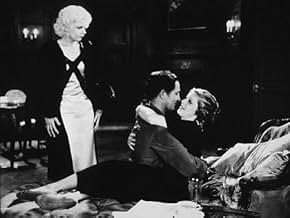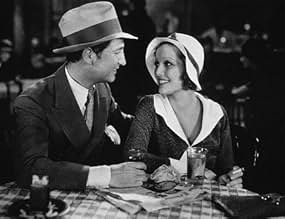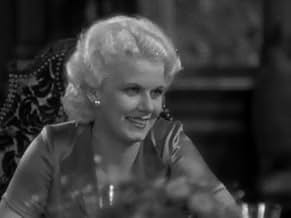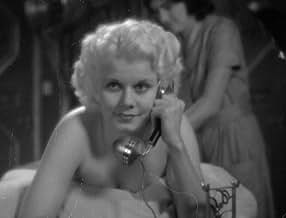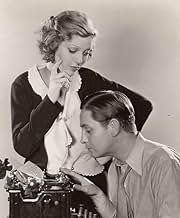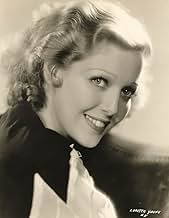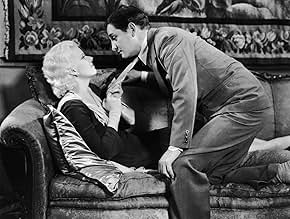IMDb रेटिंग
6.7/10
3.8 हज़ार
आपकी रेटिंग
अपनी भाषा में प्लॉट जोड़ेंA young woman from a very rich family impulsively marries a reporter, but each assumes the other is the one whose lifestyle must change.A young woman from a very rich family impulsively marries a reporter, but each assumes the other is the one whose lifestyle must change.A young woman from a very rich family impulsively marries a reporter, but each assumes the other is the one whose lifestyle must change.
- पुरस्कार
- कुल 2 जीत
Don Dillaway
- Michael Schuyler
- (as Donald Dillaway)
Claud Allister
- Dawson - The Valet
- (as Claude Allister)
Wilson Benge
- Butler
- (बिना क्रेडिट के)
Vance Carroll
- Reporter
- (बिना क्रेडिट के)
Eddy Chandler
- Hank - A Reporter
- (बिना क्रेडिट के)
Richard Cramer
- Speakeasy Proprietor
- (बिना क्रेडिट के)
Oliver Eckhardt
- Reporter
- (बिना क्रेडिट के)
Bill Elliott
- Ann's Beau - The Round-the-World Flyer
- (बिना क्रेडिट के)
Adolph Faylauer
- Party Guest
- (बिना क्रेडिट के)
J.C. Fowler
- Reporter
- (बिना क्रेडिट के)
फ़ीचर्ड समीक्षाएं
Platinum Blonde launched so many careers - the most infamous being Frank Capra and Jean Harlow. It is not a perfect film by any stretch of the imagination. The sound is bad, Harlow is terribly miscast, and poor Loretta Young struggles valiantly to bring depth to a part that is the filmic equivalent of wallpaper. As many have said before me, she and Harlow would have done well to reverse roles.
But the greatest on screen portrayal of fresh, modern, naturalistic acting (a style that later would be attributed to James Dean) is from the wonderful, refreshingly brilliant young Robert Williams in 1931!!!!! I would never mark this film as a masterpiece, yet I would encourage all struggling male actors to study this man's work as a prime example of how to dominate a scene without any artifice or aggression. Every time he enters a room, the whole film lights up, and every time he leaves, all the other actors seem to lose their purpose and energy.
I have never seen such simple perfection, and I am saddened to no end to learn of his untimely death at thirty-four, just as he was starting to get roles worthy of his genius. I could not get enough of this man's work, and regret having so little of it to view. An absolute must see for Robert Williams alone!
But the greatest on screen portrayal of fresh, modern, naturalistic acting (a style that later would be attributed to James Dean) is from the wonderful, refreshingly brilliant young Robert Williams in 1931!!!!! I would never mark this film as a masterpiece, yet I would encourage all struggling male actors to study this man's work as a prime example of how to dominate a scene without any artifice or aggression. Every time he enters a room, the whole film lights up, and every time he leaves, all the other actors seem to lose their purpose and energy.
I have never seen such simple perfection, and I am saddened to no end to learn of his untimely death at thirty-four, just as he was starting to get roles worthy of his genius. I could not get enough of this man's work, and regret having so little of it to view. An absolute must see for Robert Williams alone!
Robert Williams plays the kind of role Spencer Tracy did time and again at Fox and MGM--the brash, likeable working man--and, in fact, the picture suggests a dry run of Tracy's "Libeled Lady." There's a breach-of-promise suit, a roomful of reporters cracking wise, a rich-rich Long Island clan existing to be mocked, and the kind of farcical complications that made the newspaper comedy one of the '30s' most endearing genres. Unfortunately, the dialogue isn't as snappy as it thinks it is, and Jean Harlow is as miscast as a society dame as Loretta Young is as a world-weary reporter -- the whole thing might have made more sense if they switched roles. The compensations, though, are many: Capra giving his actors brilliant bits of business (the "puttering" scene is an unsung classic), a roster of swell character actors, and some pre-Production Code naughtiness, including two very sexy love scenes between Williams and Harlow. Capra's pace is slower than usual, and his later works had cleverer plot twists. His handling of actors, though, is as beautiful to behold as ever. And in Williams' irresistible performance, we have a glimpse of a star that might have been.
After watching Platinum Blonde, I, like most other viewers, had to look up Robert Williams, wondering whatever happened to him while fearing the worst, the worst being true: he died shortly after he made this film. Tragic! One can wonder endlessly over what might have been. What is clear is that he was a natural for the camera, was highly skilled (years of stage experience behind him), and fit perfectly into the Capra-Riskind universe of tough-but- articulate Everyman up against monied mediocrities. He might well have ended up playing the Clark Gable role in It Happened One Night if he had been around at the time. In fact, the reporter he plays here seems like a first draft for that character. (The plot involves Williams as a reporter falling in love impulsively with the daughter of a wealthy Social Register family only to encounter the usual boobytraps built into such a union.)
The movie itself, though hard to separate from Williams's domination of it, stands up fairly well on its own. There are some imaginative camera movements and setups and intelligent, witty dialogue laced with fizzy Depression-era argot. The story is not very convincing but you suspend disbelief because of the way the actors, dialogue and cinematography bring it to life. The pace is leisurely, sometimes a bit too much so, with many minutes taken up in gentle, playful, ultra-naturalistic banter between Williams and his co-stars. I can't think of another film from that period that detoured so often into that type of throwaway conversational interlude.
Jean Harlow as the heiress and Loretta Young as a newspaper columnist are not ideally cast. Their roles should have been reversed, but it doesn't really matter because both actresses do well. Harlow, who by this time had had relatively little experience in front of a camera, seems right at home about 90% of the time. And it's hard to believe that Loretta Young was only 18 when she made this! But she had already been a veteran of several years standing as a film actress.
The movie itself, though hard to separate from Williams's domination of it, stands up fairly well on its own. There are some imaginative camera movements and setups and intelligent, witty dialogue laced with fizzy Depression-era argot. The story is not very convincing but you suspend disbelief because of the way the actors, dialogue and cinematography bring it to life. The pace is leisurely, sometimes a bit too much so, with many minutes taken up in gentle, playful, ultra-naturalistic banter between Williams and his co-stars. I can't think of another film from that period that detoured so often into that type of throwaway conversational interlude.
Jean Harlow as the heiress and Loretta Young as a newspaper columnist are not ideally cast. Their roles should have been reversed, but it doesn't really matter because both actresses do well. Harlow, who by this time had had relatively little experience in front of a camera, seems right at home about 90% of the time. And it's hard to believe that Loretta Young was only 18 when she made this! But she had already been a veteran of several years standing as a film actress.
There is a scene with Robert Williams and Jean Harlow singing a ditty to each other. There was such natural wit and affection that their infatuation and joy in each others company was perfectly expressed. This was love, this was sensuality, without a hint of the physicality that modern movies are forced to graphicly depict. Seeing a movie like this, made in low fidelity black and white seventy years ago shows what we have lost.
In The Films Of Frank Capra Citadel Film Series and in his memoirs, Frank Capra described Platinum Blonde as a film that Columbia did strictly as a moneymaker, no messages of social significance that would be found in his later classic work, just a nice girl-boy-girl comedy. Still and probably because Robert Riskin did some of the dialog I found plenty of things that would be instantly recognizable in Capra's more well known films.
The Platinum Blonde is of course Jean Harlow and this film title gave her the title she would have the rest of her short life. She's a society girl who sweeps reporter Robert Williams off his feet and into marriage much to the chagrin of her formidable dowager mother Louise Closser Hale.
Someone else is chagrined as well, Loretta Young who was only 18 when she made this film. Loretta and her sisters added a few years onto their ages in order to work back then. Loretta plays one of Williams fellow reporters who is known only by her last name of Gallagher. Just like Jean Arthur was known as Saunders in Mr. Smith Goes To Washington. Lots of similarities between the two though Arthur's character was far more sophisticated than Young.
Still Platinum Blonde more closely resembles Mr. Deeds Goes To Town. Williams is like Gary Cooper trapped in that big mansion. Only it was Cooper's own mansion that he inherited. Robert Williams is in on a pass and on a kind of probation so to speak, to see if he can adjust to life among the idle rich. In 1931 lots of people would have liked to have been given the opportunity.
The only one in the household he strikes up some kind of friendship with is butler Halliwell Hobbes. Note the echo business with them, it would be repeated in Mr. Deeds.
The week Platinum Blonde was released with reviews acclaiming Williams as a new star, he died of peritonitis. What an incredible loss, he was an actor with a breezy insouciance just like Robert Montgomery or William Haines over at MGM. He probably could also have done parts at Columbia that James Cagney was doing at Warner Brothers. Williams could have been Harry Cohn's first major star of the sound era. Anyway his comic timing was perfect and he steals the film from those two movie legends who were his leading ladies.
You'll also like Reginald Owen's portrayal as Harlow's family attorney and general busybody. Williams also deals with him in the way Gary Cooper ultimately dealt with his shyster.
Platinum Blonde is one of Frank Capra's best early films and watching it will make you sad though when you see Robert Williams and you will agree that he had a brilliant career ahead of him.
The Platinum Blonde is of course Jean Harlow and this film title gave her the title she would have the rest of her short life. She's a society girl who sweeps reporter Robert Williams off his feet and into marriage much to the chagrin of her formidable dowager mother Louise Closser Hale.
Someone else is chagrined as well, Loretta Young who was only 18 when she made this film. Loretta and her sisters added a few years onto their ages in order to work back then. Loretta plays one of Williams fellow reporters who is known only by her last name of Gallagher. Just like Jean Arthur was known as Saunders in Mr. Smith Goes To Washington. Lots of similarities between the two though Arthur's character was far more sophisticated than Young.
Still Platinum Blonde more closely resembles Mr. Deeds Goes To Town. Williams is like Gary Cooper trapped in that big mansion. Only it was Cooper's own mansion that he inherited. Robert Williams is in on a pass and on a kind of probation so to speak, to see if he can adjust to life among the idle rich. In 1931 lots of people would have liked to have been given the opportunity.
The only one in the household he strikes up some kind of friendship with is butler Halliwell Hobbes. Note the echo business with them, it would be repeated in Mr. Deeds.
The week Platinum Blonde was released with reviews acclaiming Williams as a new star, he died of peritonitis. What an incredible loss, he was an actor with a breezy insouciance just like Robert Montgomery or William Haines over at MGM. He probably could also have done parts at Columbia that James Cagney was doing at Warner Brothers. Williams could have been Harry Cohn's first major star of the sound era. Anyway his comic timing was perfect and he steals the film from those two movie legends who were his leading ladies.
You'll also like Reginald Owen's portrayal as Harlow's family attorney and general busybody. Williams also deals with him in the way Gary Cooper ultimately dealt with his shyster.
Platinum Blonde is one of Frank Capra's best early films and watching it will make you sad though when you see Robert Williams and you will agree that he had a brilliant career ahead of him.
क्या आपको पता है
- ट्रिवियाIn a 2008 interview, actor Christopher Plummer called Williams "...one of the most realistic comedians the screen had. He made Cary Grant look like he was overacting... To watch Robert Williams act was like seeing a comic using the Method, long before the Method became famous with Marlon [Brando] (Marlon Brando) and Monty [Clift] (Montgomery Clift)."
- गूफ़When they are looking at the front page of "The Tribune Paper", in the headlines, the word "okay" is misspelled. It shows "It's okey with me."
The spelling of "OK" was not standardized for a long time. Writer Dashiell Hammett among others spelled it "okeh" and "oke",
- भाव
Dexter Grayson: Where were you yesterday?
Anne Schuyler: Oh, Stew and I went for a long ride. Dexter, is there any finishing school we could send him to?
Dexter Grayson: Yes - Sing Sing!
- कनेक्शनEdited into 365 days, also known as a Year (2019)
टॉप पसंद
रेटिंग देने के लिए साइन-इन करें और वैयक्तिकृत सुझावों के लिए वॉचलिस्ट करें
- How long is Platinum Blonde?Alexa द्वारा संचालित
विवरण
- रिलीज़ की तारीख़
- कंट्री ऑफ़ ओरिजिन
- भाषा
- इस रूप में भी जाना जाता है
- Gallagher
- फ़िल्माने की जगहें
- उत्पादन कंपनी
- IMDbPro पर और कंपनी क्रेडिट देखें
बॉक्स ऑफ़िस
- बजट
- £6,00,000(अनुमानित)
- चलने की अवधि1 घंटा 29 मिनट
- रंग
इस पेज में योगदान दें
किसी बदलाव का सुझाव दें या अनुपलब्ध कॉन्टेंट जोड़ें


